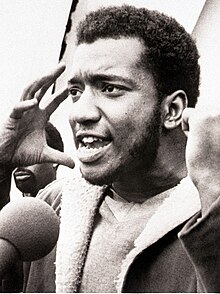
Back فريد هامبتون Arabic Fred Hampton Catalan Fred Hampton German Fred Hampton Spanish فرد همپتون FA Fred Hampton Finnish Fred Hampton French Fred Hampton GL פרד המפטון HE Fred Hampton ID
Fred Hampton | |
|---|---|
 Hampton speaking at a rally in Grant Park, Chicago, September 1969 | |
| Born | Fredrick Allen Hampton August 30, 1948 |
| Died | December 4, 1969 (aged 21) Chicago, Illinois, U.S. |
| Cause of death | Assassination (gunshot wounds)[1][2][3] |
| Education | Triton College |
| Occupation(s) | Activist, revolutionary |
| Years active | 1966–1969 |
| Known for | Chairman of the Illinois chapter of the Black Panther Party |
| Political party | Black Panther |
| Partner | Akua Njeri |
| Children | Fred Hampton Jr. |
Fredrick "Chairman Fred" Allen Hampton Sr. (August 30, 1948 – December 4, 1969) was an American activist. He came to prominence in his late teens and very early 20s in Chicago as deputy chairman of the national Black Panther Party and chair of the Illinois chapter. As a progressive African American, he founded the anti-racist, anti-classist Rainbow Coalition,[4] a prominent multicultural political organization that initially included the Black Panthers, Young Patriots (which organized poor whites), and the Young Lords (which organized Hispanics), and an alliance among major Chicago street gangs to help them end infighting and work for social change. A Marxist–Leninist-Maoist,[5][6] Hampton considered fascism the greatest threat, saying, "nothing is more important than stopping fascism, because fascism will stop us all."[7]
In 1967, the Federal Bureau of Investigation (FBI) identified Hampton as a radical threat. It tried to subvert his activities in Chicago, sowing disinformation among black progressive groups and placing a counterintelligence operative in the local Panthers organization. In December 1969, Hampton was drugged,[8][9] then shot and killed in his bed during a predawn raid at his Chicago apartment by a tactical unit of the Cook County State's Attorney's Office, who received aid from the Chicago Police Department and the FBI leading up to the attack. Law enforcement sprayed more than 100 gunshots throughout the apartment; the occupants fired once.[10] During the raid, Panther Mark Clark was also killed and several others were seriously wounded. In January 1970, the Cook County Coroner held an inquest; the coroner's jury concluded that Hampton's and Clark's deaths were justifiable homicides.[11][12][13][14]
A civil lawsuit was later filed on behalf of the survivors and the relatives of Hampton and Clark.[15] It was resolved in 1982 by a settlement of $1.85 million (equivalent to $5.84 million in 2023); the U.S. federal government, Cook County, and the City of Chicago each paid one-third to a group of nine plaintiffs. Given revelations about the illegal COINTELPRO program and documents associated with the killings, many scholars now consider Hampton's death at age 21, a deliberate murder, or an assassination at the FBI's initiative.[1][2][3][16][17]
- ^ a b Stubblefield, Anna (May 31, 2018). Ethics Along the Color Line. Cornell University Press. pp. 60–61. ISBN 9781501717703. Archived from the original on January 9, 2021. Retrieved July 4, 2019.
- ^ a b Burrough, Bryan (2016). Days of Rage: America's Radical Underground, the FBI, and the Forgotten Age of Revolutionary Violence. Penguin Publishing Group. pp. 84–85. ISBN 9780143107972. Archived from the original on January 9, 2021. Retrieved November 11, 2020.
- ^ a b Lee, William (December 3, 2019). "In 1969, Charismatic Black Panthers Leader Fred Hampton Was Killed in a Hail of Gunfire. 50 Years Later, the Fight Against Police Brutality Continues". Chicago Tribune. Archived from the original on January 9, 2021. Retrieved December 3, 2019.
- ^ "From the Bullet to the Ballot | Jakobi Williams". University of North Carolina Press.
- ^ Haas 2009, p. 4.
- ^ Delphine (January 21, 2015). "Fred Hampton – It's A Class Struggle Goddammit!, November, 1969". www.lfks.net. Archived from the original on February 12, 2021. Retrieved February 13, 2021.
- ^ "Fred Hampton on Revolution – Bay Area Television Archive".
- ^ Ali, Rasha (February 13, 2021). "Fact-checking 'Judas and the Black Messiah': Was Fred Hampton drugged or arrested over ice cream?". USA Today. Archived from the original on March 22, 2021.
- ^ Thamm, Natalie (April 7, 2019). "Murder or "Justifiable Homicide"?: The Death of the Revolutionary Fred Hampton". STMU History Media. Archived from the original on March 22, 2021. Retrieved March 22, 2021.
- ^ Lee, William (December 3, 2019). "In 1969, charismatic Black Panthers leader Fred Hampton was killed in a hail of gunfire. 50 years later, the fight against police brutality continues". Chicago Tribune. Archived from the original on March 22, 2021. Retrieved March 22, 2021.
- ^ Haas 2009, p. 111.
- ^ Dolan, Thomas J. (January 22, 1970). "Panther Inquest Backs Police" (PDF). Chicago Sun-Times. Chicago. p. 3. Archived from the original on May 14, 2016. Retrieved October 15, 2015.
- ^ Rutberg, Susan (December 6, 2017). "Nothing but a Northern Lynching: The Death of Fred Hampton Revisited". Huffpost. Archived from the original on April 3, 2019. Retrieved October 19, 2019.
- ^ Thamm, Natalie (April 7, 2019). "Murder or 'Justifiable Homicide'?: The Death of the Revolutionary Fred Hampton". STMU History Media. Archived from the original on October 20, 2019. Retrieved October 19, 2019.
- ^ Morris, Rose (2019). Chronicle of the Seventh Son Black Panther Mark Clark. United States: Rose Morris. pp. 203–214. ISBN 978-1733581714.
- ^ Williams, Jakobi (2013). "Law Enforcement Repression and the Assassination of Chairman Fred Hampton". From the Bullet to the Ballot: The Illinois Chapter of the Black Panther Party and Racial Coalition Politics in Chicago. University of North Carolina Press. pp. 167–190. ISBN 978-0-8078-3816-7. JSTOR 10.5149/9781469608167_williams.10.
- ^ Wilderson 2015, p. 304.